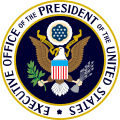References
- ↑ "ArtII.S2.C1.2 Presidential Advisors". Library of Congress. Retrieved July 1, 2021.
- ↑ "A Matter of Simple Justice". Richard Nixon Foundation. September 1, 2015. Retrieved July 2, 2021.
- ↑ "Executive Order 12329—President's Task Force on Private Sector Initiatives". The American Presidency Project. October 14, 1981. Retrieved July 2, 2021.
- ↑ "Executive Order 12360—President's Task Force on Victims of Crime". The American Presidency Project. April 23, 1982. Retrieved July 2, 2021.
- ↑ "Executive Order 12614—Presidential Task Force on Market Mechanisms". The American Presidency Project. November 5, 1987. Retrieved July 2, 2021.
- ↑ "Climate Change Task Force". Clinton White House. Retrieved July 2, 2021.
- ↑ "Executive Order 13183—Establishment of the Presidents Task Force on Puerto Ricos Status". The American Presidency Project. December 23, 2000. Retrieved July 2, 2021.
- ↑ "Executive Order Establishment of the Corporate Fraud Task Force". George W. Bush White House. July 9, 2002. Retrieved July 2, 2021.
- ↑ "Executive Order: Task Force on New Americans". George W. Bush White House. June 7, 2006. Retrieved July 2, 2021.
- ↑ "Press Release - White House Announces Middle Class Task Force". The American Presidency Project. January 30, 2009. Retrieved July 2, 2021.
- ↑ "Geithner, Summers Convene Official Designees to Presidential Task Force on the Auto Industry". Obama White House. February 20, 2009. Archived from the original on 2021-01-26. Retrieved July 2, 2021.
- ↑ "Presidential Memorandum -- Establishing a Task Force on Childhood Obesity". Obama White House. February 9, 2010. Retrieved July 2, 2021.
- ↑ "Presidential Memoranda-- Task Force on Space Industry WorkForce and Economic Development". Obama White House. May 3, 2010. Archived from the original on 2021-03-21. Retrieved July 2, 2021.
- ↑ "Executive Order 13684—Establishment of the President's Task Force on 21st Century Policing". The American Presidency Project. December 18, 2014. Retrieved July 2, 2021.
- ↑ "Memorandum -- Establishing a White House Task Force to Protect Students from Sexual Assault". Obama White House. January 22, 2014. Retrieved July 2, 2021.
- ↑ "Establishing the Task Force on Missing and Murdered American Indians and Alaska Natives". Federal Register. December 2, 2019. Retrieved July 2, 2021.
- ↑ "Statement from the Press Secretary Regarding the President's Coronavirus Task Force". Trump White House. January 29, 2020. Retrieved July 2, 2021.
- ↑ "Coronavirus (COVID-19) Pandemic: Supply Chain Stabilization Task Force". FEMA. March 30, 2020. Retrieved July 2, 2021.
- ↑ "Letter to VP Pence - Coronavirus Medical Supply Chain" (PDF). United States Senate. March 26, 2020. Retrieved July 2, 2021.
- ↑ "President Donald J. Trump Announces Great American Economic Revival Industry Groups". Trump White House. April 14, 2020. Retrieved July 2, 2021.
- ↑ Office of the Press Secretary (January 29, 2025). "Celebrating America's 250th Birthday". whitehouse.gov – via National Archives.
- ↑ Colvin, Jill (2025-01-29). "Trump signs order to plan nation's 250th anniversary celebration, punish those who vandalize statues". AP News. Retrieved 2025-01-31.
- ↑ "President Biden Announces Members of the Biden-Harris Administration COVID-19 Health Equity Task Force". White House. February 10, 2021. Retrieved July 2, 2021.
- ↑ "FACT SHEET: Biden-Harris Administration Announces Supply Chain Disruptions Task Force to Address Short-Term Supply Chain Discontinuities". White House. June 8, 2021. Retrieved July 2, 2021.
- ↑ "Executive Order on Tackling the Climate Crisis at Home and Abroad". White House. January 27, 2021. Retrieved July 2, 2021.
- ↑ "Executive Order on the Establishment of Interagency Task Force on the Reunification of Families". White House. February 2, 2021. Retrieved July 2, 2021.
- ↑ "Executive Order on Worker Organizing and Empowerment". White House. April 26, 2021. Retrieved July 2, 2021.
- ↑ "The White House Announces Scientific Integrity Task Force Formal Launch and Co-Chairs". White House. May 10, 2021. Retrieved July 2, 2021.
- ↑ "The Biden Administration Launches the National Artificial Intelligence Research Resource Task Force". White House. June 10, 2021. Retrieved July 2, 2021.
- ↑ "Fact Sheet: Biden-Harris Administration Advances Cleaner Industrial Sector to Reduce Emissions and Reinvigorate American Manufacturing". White House. February 15, 2022. Retrieved March 3, 2022.
- ↑ "FACT SHEET: President Biden Issues Executive Order at the First Meeting of the Task Force on Reproductive Healthcare Access". White House. August 3, 2022. Retrieved November 16, 2022.
- ↑ "Kamala Harris launches new national task force on preventing online harassment and abuse". CNN. June 16, 2022. Retrieved July 20, 2023.

